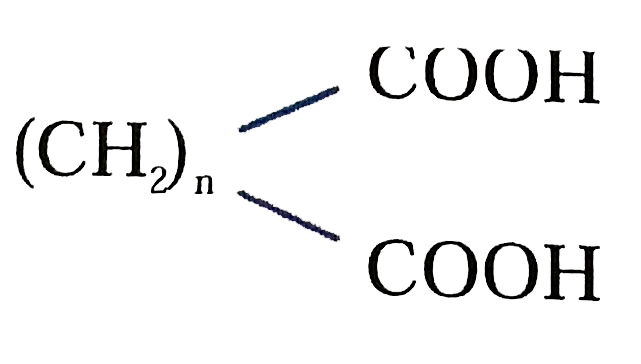A dicarboxylic acid of the form

does not undergo decarboxylation on strong heating rather gives anothr stable product of molecular weight 100. Identify n.
The correct Answer is:2
Step by step video, text & image solution for A dicarboxylic acid of the form does not undergo decarboxylation on strong heating rather gives anothr stable product of molecular weight 100. Identify n. by Chemistry experts to help you in doubts & scoring excellent marks in Class 12 exams.
Topper's Solved these Questions
Similar Questions
How many of the following two statements are incorrect? "
I) Carboxylic acid on heating with soda lime undergoes decarboxylation reaction occurs through generation of carbocation
II) CH4 produced as a chief product in wurtz reactionView SolutionLactic acid gives n number of geometrical isomeric products on strong heating along. What is the value of n?
View Solution
Knowledge Check
- Question 1 - Select One
Which one of the following acids undergoes decarboxylation on strong heating:
AAdipic acidB3- oxo butanoic acidCFormic acidDSalicylic acid - Question 2 - Select One
Which of the following β-keto carboxylic acid does not undergo decarboxylation on heating ?
A B
B C
C DNone of these
DNone of these
An organic compound (A) with molecular formula C8H8O forms an orange red precipitate with 2,4 -DNP reagent and gives yellow precipitate on heating with iodine in the presence of sodium hydroxide . It neither reduces Tollen's reagent or Fehling's solution , nor does it decolourise bromine water or Baeyer's reagent. On drastic oxidation with chromic acid, it gives a carboxylic acid (B) having molecular formulae C7H6O2. Identify the compound (A) and (B) and explain the reactions involved .
View SolutionBoric acid on heating at 100∘C, gives (X). (X) on heating at 160∘C gives (Y) and (Y) on heating at red hot gives (Z). Identify (X),(Y) and (Z).
View SolutionVariety of products are obtained when dicarboxylic acids are heated. The nature of product depends on the carbon chain length seperating the two carboxylic groups.
(I) 1 ,2 and 1,3-dibasic acids on heating give monocarboxylic acid
(II) 1,4 and 1,5-dibasic acids on heating give cyclic anhydride
(III) 1,6 and 1,7-dibasic acids give cyclic ketones.
Indicate whether the following reactions are right or wrong.
 View Solution
View SolutionVariety of products are obtained when dicarboxylic acids are heated. The nature of product depends on the carbon chain length seperating the two carboxylic groups.
(I) 1 ,2 and 1,3-dibasic acids on heating give monocarboxylic acid
(II) 1,4 and 1,5-dibasic acids on heating give cyclic anhydride
(III) 1,6 and 1,7-dibasic acids give cyclic ketones.
Indicate whether the following reactions are right or wrong.
 View Solution
View SolutionVariety of products are obtained when dicarboxylic acids are heated. The nature of product depends on the carbon chain length seperating the two carboxylic groups.
(I) 1 ,2 and 1,3-dibasic acids on heating give monocarboxylic acid
(II) 1,4 and 1,5-dibasic acids on heating give cyclic anhydride
(III) 1,6 and 1,7-dibasic acids give cyclic ketones.
Indicate whether the following reactions are right or wrong.
 View Solution
View SolutionVariety of products are obtained when dicarboxylic acids are heated. The nature of product depends on the carbon chain length seperating the two carboxylic groups.
(I) 1 ,2 and 1,3-dibasic acids on heating give monocarboxylic acid
(II) 1,4 and 1,5-dibasic acids on heating give cyclic anhydride
(III) 1,6 and 1,7-dibasic acids give cyclic ketones.
Indicate whether the following reactions are right or wrong.
 View Solution
View Solution

